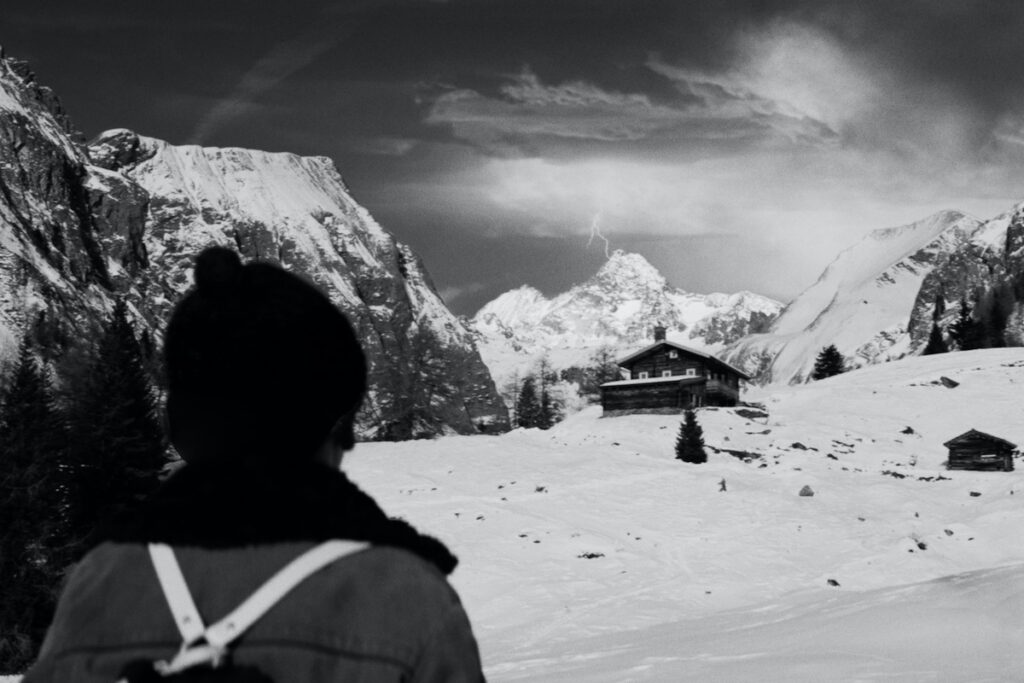‘The Universal Theory’ Creates a Multi-Genre Collage of a Multiverse From Europe’s Post-World War II Trauma
The entire feature could be said to be an experiment in style, with its black-and-white imagery, cinemascope lensing, the occasional retro editing wipe, evocative sound design, and Lynchian lighting effects.

The multiverse has gone mainstream. After languishing in scientific and philosophical realms for years, the idea that there is an assemblage of alternate realities has gained traction in popular culture, especially movies: It’s seen in “Everything Everywhere All at Once,” which won the 2023 Academy Award for Best Picture, and nearly every single superhero release, like the summer blockbuster “Deadpool & Wolverine.”
A new foreign-language film from German director Timm Kröger, “The Universal Theory,” also leverages the multiverse premise for its exploration of post-World War II Europe. The film’s parallel universes concept is not its only nod to multiplicities, though, for it also contains numerous genres, such as film noir, action-adventure, philosophical arthouse, horror, and, of course, science fiction. It’s a dense yet heady mix, challenging for sure, but made with such verve and style that one keys into its convoluted plot, even if complete computation and coherence remains elusive.
After a prologue in 1974 in which our protagonist Johannes looks directly into the camera in an attempt to speak with someone in another universe, and a title sequence involving children that we learn later is not a flashback, the film’s time and place settles in 1962 at a quantum physics conference in the Swiss Alps. Johannes is there with Professor Strathen, who is advising the student on his doctoral thesis, which, as far as we can tell, has to do with transcending proverbial time and space. Strathen is skeptical, even dismissive, of the dissertation, but Professor Blumberg, an old academic adversary of Johannes’s mentor, thinks the young man is onto something big.
What follows as Johannes meets a mysterious woman called Karin and takes walks amongst the majestic mountainous is certainly intriguing, though it can be obtuse, particularly due to multiple shots of his mathematical notations. Yet the film affects an ironical style, most evident in its deadpan dialogue, meta-references, and archly old-fashioned score, which goes a long way in helping sell the story’s theoretical bent. Indeed, the entire feature could be said to be an experiment in style, with its black-and-white imagery, cinemascope lensing, the occasional retro editing wipe, evocative sound design, and Lynchian lighting effects.

The narrative’s substance starts to formulate after a night in which Blumberg unknowingly takes the hotel’s lift to a hidden passageway under the mountains. And Johannes, who had a feeling of déjà vu when he first saw Karin, comes to find out she knows a dark, almost undiscoverable secret from his past. Soon, Johannes and Karin grow both closer and more distant, as the soundtrack provides them with a love theme even while murders and suspicious deaths start to occur, with Johannes a suspect. Doppelgangers, guns, atmospheric avalanches, uranium mining, and oodles of cigarette smoke outline the film’s mood of espionage and covert scientific breakthroughs, with clunky plot explanations somewhat filling in the picture.
The film’s noirish feel consolidates around Karin, the femme fatale complete with black bangs. Despite the genre’s strictures, supporting actress Olivia Ross could be said to give a fuller performance as Karin than that offered by lead actor Jan Bülow, whose Johannes remains a cipher throughout, which is seemingly intentional on the part of director Kröger. As the garrulous, expansive Blumberg, Gottfried Breitfuss greatly enlivens the first half, with some of the film’s comic energy exiting when he does.
References to Nazis, collaboration, anti-semitism, the Holocaust, and the atomic bomb hint at characters who are living in a hallucinatory, post-traumatic state in which the ghosts of World War II are among them, sometimes literally. The Cold War is at its height, with the Cuban Missile Crisis, and there’s a literal cold war on the snowy slopes of the Alps. The historically serious and the drolly absurd co-exist in the world of “The Universal Theory.”
Once Johannes discovers the underground passageway that Blumberg had found, the film’s Spielbergian quotient rises to the fore and then climaxes with a brief but brilliant abstract montage of what looks like black holes. After which, during the denouement, Mr. Kröger relies on voiceover narration, and glimpses of Johannes’s later life to fill in some of the blanks, though one could say it raises more questions than it answers. There’s even a nod to cheesy 1970s Italian cinema.
Having committed to going along with the movie’s conceit, in spite or perhaps because of its far-fetched and florid presentation, viewers may not help but feel let down by its depressive, deflating ending. Its multiverse concept seemed to call out for a grander and/or more enigmatic epilogue, not postmodern analysis. This viewer, though, reassures himself with the notion that there’s another conclusion to the film, to be found in an alternate universe.

